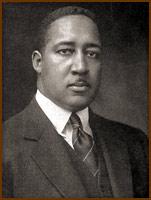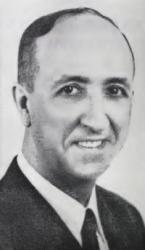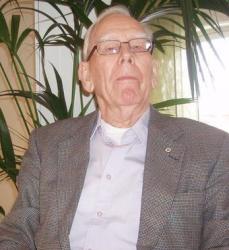
1901 - 1967 Person Name: John W. Work (1901-1967) Arranger of "[Do Lord, do Lord]" in Lift Every Voice and Sing II John Wesley Work III (1901-1967)
Composer, educator, choral director, and ethnomusicologist John Wesley Work III was born on June 15, 1901, in Tullahoma, Tennessee, to a family of professional musicians. His grandfather, John Wesley Work, was a church choir director in Nashville, where he wrote and arranged music for his choirs. Some of his choristers were members of the original Fisk Jubilee Singers. His father, John Wesley Work Jr., was a singer, folksong collector and professor of music, Latin, and history at Fisk, and his mother, Agnes Haynes Work, was a singer who helped train the Fisk group. His uncle, Frederick Jerome Work, also collected and arranged folksongs, and his brother, Julian, became a professional musician and composer.
Work began his musical training at the Fisk University Laboratory School, moving on to the Fisk High School and then the university, where he received a B.A. degree in 1923. After graduation, he attended the Institute of Musical Art in New York City (now the Julliard School of Music), where he studied with Gardner Lamson. He returned to Fisk and began teaching in 1927, spending summers in New York studying with Howard Talley and Samuel Gardner. In 1930 he received an M.A. degree from Columbia University with his thesis American Negro Songs and Spirituals. He was awarded two Julius Rosenwald Foundation Fellowships for the years 1931 to 1933 and, using these to take two years leave from Fisk, he obtained a B.Mus. degree from Yale University in 1933.
Work spent the remainder of his career at Fisk, until his retirement in 1966. He served in a variety of positions, notably as a teacher, chairman of the Fisk University Department of Music, and director of the Fisk Jubilee Singers from 1947 until 1956. He published articles in professional journals and dictionaries over a span of more than thirty years. His best known articles were "Plantation Meistersingers" in The Musical Quarterly (Jan. 1940), and "Changing Patterns in Negro Folksongs" in the Journal of American Folklore (Oct. 1940).
Work began composing while still in high school and continued throughout his career, completing over one hundred compositions in a variety of musical forms -- for full orchestra, piano, chamber ensemble, violin and organ -- but his largest output was in choral and solo-voice music. He was awarded first prize in the 1946 competition of the Federation of American Composers for his cantata The Singers, and in 1947 he received an award from the National Association of Negro Musicians. In 1963 he was awarded an honorary doctorate from Fisk University.
Following Work's collection Negro Folk Songs, the bulk of which was recorded at Fort Valley, he and two colleagues from Fisk University, Charles S. Johnson, head of the department of sociology (later, in October 1946, chosen as the university's first black president), and Lewis Jones, professor of sociology, collaborated with the Archive of American Folk Song on the Library of Congress/Fisk University Mississippi Delta Collection (AFC 1941/002). This project was a two-year joint field study conducted by the Library of Congress and Fisk University during the summers of 1941 and 1942. The goal of the partnership was to carry out an intensive field study documenting the folk culture of a specific community of African Americans in the Mississippi Delta region. The rapidly urbanizing commercial area of Coahoma County, Mississippi, with its county seat in Clarksdale, became the geographical focus of the study. Some of the correspondence included in this collection between Work and Alan Lomax, then head of the Archive of American Folk Song, touches on both the Fort Valley and the emerging Fisk University recording projects.
John Wesley Work died on May 17, 1967.
--memory.loc.gov/ammem/ftvhtml/
John W. Work


